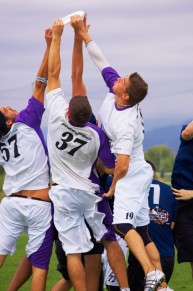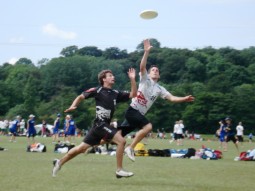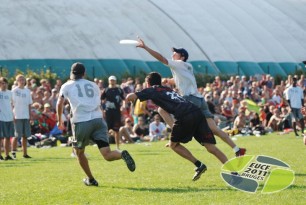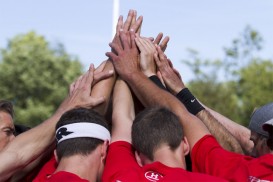The USAU Club Series just kicked off this month and at the same time the highlight of the year for European club teams is just around the corner. Europe’s elite club teams are about to crown their king and queen in the annual European Ultimate Championship Series (EUCS) for open and women’s clubs. From the 28th until the 30th of September, the European Ultimate Championship Finals (EUCF) will be held in Frankfurt/Main, Germany. In this article, I will give a short explanation on how this tournament series works. Moreover, I recently had the chance to talk with the captains of some of the finest club teams in Europe: Marc “Britney” Guilbert, Stefan Johansson and Marc “Mo” Mosimann. We talked about the upcoming tournament and the development of ultimate in Europe in general.
Britney is the captain for the Clapham club team that have won the previous twelve straight national titles in the UK and have won the European Championships twice in the past. He was also the captain for the GB open team that won the silver medal at the World Championships in Sakai earlier this year. Stefan Johansson is the captain from Viksjöfors IF, the Swedish national champion in 2011 and 2012. Many of the players from their current roster played for Sweden in the open division in Japan where they made it to the semi-finals after winning the European championship last year in Maribor, Slovenia. In 2010 Viksjöfors finished 8th at WUCC. Mo is one of the captains for Flying Angels from Bern. Flying Angels is the record-holding national champion of Switzerland. They also won the EUCF both in 2010 and 2011.
Structure of the European Ultimate Championship Series (EUCS)
The EUCS creates a base structure and calendar for the series and involve as many teams and nations and players as possible. The benefit of this tournament structure is to create better competition for the top European teams and provide incentive for mid-level clubs to improve their games with the hope of making it to finals.
To achieve these goals (similar to the USAU Club Series) Europe has been divided into different geographic regions. Each nation (or group of nations if they are very small) may send a maximum number of qualified teams to its European Club Regional (EUCR) tournament. These teams compete at the EUCRs to advance to the European Club Finals (EUCF).
There are currently five regions. These regions are composed of “nearest neighbour” nations to reduce cost and travel time to EUCR tournaments. The regions are as follows:
- West : UK
- Central : Denmark – Germany – Holland – Belgium – Luxembourg
- South : Ireland – France – Switzerland – Italy – Spain – Portugal – Israel
- East : Poland – Czech Rep – Austria – Slovakia – Slovenia – Croatia – Belarus – Ukraine – Hungary
- North : Norway – Sweden – Finland – Russia – Latvia – Estonia – Lithuania
The best teams from each region play a three-day tournament to determine the European Club Champion. Bids to the annual EUCF are distributed according to prior results from the EUCF.
I discussed with Britney, Stefan and Mo what importance the EUCS has for their club teams and the overall development of ultimate in their home countries. Mo pointed out that, “particularly the best teams from Switzerland benefit from competing with other European teams.” Although, he went on to note that, “many teams from Switzerland do not take part in the series and therefore one cannot state that the EUCS has an influence on the whole Swiss ultimate community.”
Another argument is that the teams not competing in the EUCS can benefit at nationals from playing against teams that have improved due the experience they gained from playing regularly against other top teams from Europe. But you have to admit that at national championships in most of the European countries there are usually only a few (and mostly the same) clubs competing for the national title for many years. Especially for these teams it is very helpful to play on a regular basis against good club teams from other countries to improve their skills further.
Britney observed that “the European Championships are a crucial platform to expose young players to the intensity of international competition. Bearing in mind that EUCF might be the first international tournament for some of Clapham’s newest squad members, we use EUCF to exposure players as much as possible.” He adds, “[this] development strategy has played an integral part in our domestic and international success over our 12 year history is one by which we hope to reach greater heights at WUCC in 2014.”
Stefan noted in this respect that in Sweden they, “had a bad trend the last couple of years and to get good competitive games we have to go out in Europe.” Accordingly, he thinks that EUCS is a great way to do this. He also explained that “the regional qualification also is great for the teams below elite since they too, can have good games against teams they don’t usually play.”
As a matter of fact, the ultimate scene in most of the European countries is rather small compared to the US. For instance, there are only about 2,500 registered ultimate players in Germany. There are several cities in the US with more players than that alone. Going out to Europe to play against other good teams is obviously essential for this reason, too.
EUCF in Frankfurt
This year at the EUCF in Frankfurt, there will be an Open Elite Division consisting of eight teams (two pools of four teams) and an Open Challenger Division with 16 teams (four pools of four teams). Third and fourth in pool play in the Elite Division will play pre-quarters with the top four teams out of the second division. The top two teams from the Elite Division are rewarded with a bye. After this there will be 1-8 brackets with quarters, semis, and finals.
In Frankfurt, the two top pools in the Open Elite Division are as follows:
Pool A
– Clapham Ultimate from London, UK (twelve time national champion and European club champion in 2007 and 2005)
– Viksjöfors IF from Edsbyn, Sweden (national champion in 2011 and 2012)
– Chevron Action Flash from Manchester, UK (European club champion in 2009)
– Freespeed from Basel, Switzerland (Windmill Windup winner in 2012)
Pool B
– Flying Angels from Bern, Switzerland (record-holding national champion and European club champion in 2010 and 2011)
– Fire of London from London, UK (consistently one of the top teams in the UK)
– Silence from the Czech Republic (Silence doesn’t play Czech nationals – the team was established in 2009 to give an opportunity for Czech players to play ultimate on the highest level around Europe. Accordingly, they have players from Prague Devils (Czech national champion), Yellow Block (2nd place), Fuj (3rd place) and Tree Monkeys (4th place) and some other Czech teams)
– M.U.C. from Munich, Germany (surprising winner of the Central region this year)
These pools are promising high level competing and exciting games already in the beginning of the tournament. I talked with Britney, Mo and Stefan about their predictions for the upcoming EUCF and who would be their biggest rivals for the European club title.
Mo pointed out that all of the teams in the elite spot would have the quality to beat the other teams. “All the teams in the elite pools have a shoot at the title,” Stefan concurred. “It’s not like it was a couple of years ago when a few teams were big favourites. And one should not forget the teams in the lower pools; I would not be surprised if we see a couple of upset in the crossover games.”
“The Swiss will continue to have amazing depth and will field finely drilled squads,” Britney predicted. “Both Swiss teams should continue to challenge the top spots.” He went on to say that his second prediction would be that the German teams, though young, could have a breakout performance. With regard to his own club team Britney remarked that Clapham won EUCF in 2005 and 2007, but never since. “We lost the Championship finals last year in sudden death in an epic battle against the Angels. This has left many of us angry for revenge and frustrated by the wait,” Britney added. He explained that for this reason, this year’s Championships seem more important to them.
However, teams from Switzerland might have a slight advantage this year since they did not compete at WUGC 2012. Accordingly, they might be a bit fresher at the end of the season than other teams that had sent many players to Japan. In a recent Win the Fields article, Lou Burruss has already started discussing about how difficult the double peak can be for a team with the Clubs in Sarasota and the Worlds in Japan in the same year. I asked Britney, Stefan and Mo about their opinion and what it means for club teams having several players on the team that face such a double or even triple peak taking into consideration Worlds, the national championships and the EUCF.
Mo, seems to refuse to accept this as an excuse. He is of the opinion that many details could have an influence on the overall performance of a team. “The guys from Bern do not bother so much about this,” he noted. “In the end, every team which made it to Frankfurt can be a serious opponent for us.”
This might be seen differently from teams with many players in the squad that have already traveled around the world this year to play at Worlds which should be definitely a highlight of the year for every player that went to Japan. Indeed, Stefan addressed the problems of a multiple peak season. He mentioned in this regard that his club team would not focus on the national championships so much this year but see the EUCF as the main goal of the season. “The team going down to Frankfurt had seven players that went to Japan,” Stefan said. “At least no one put much focus on this year’s nationals, which we won after a close final against Örebro.” He further acknowledged that club-wise, the goal this year has been EUCF for Viksjöfors, especially since they missed it last year.
Britney also pointed out that a good fraction of Clapham’s squad this year was involved with the national team of GB and went to Japan for WUGC. That means that EUCF would be their 3rd championship in 2012. “It’s no secret that some of these players are finding it extremely hard to stay focused and determined throughout our preparations for this last tournament of the season,” Britney said. However, he also acknowledged that the challenge of having multiple peaks would occur every year (regardless of WUGC) and should be nothing new to Clapham. He remarked that of course nationals and EUCF occur yearly, and in addition Clapham always travels to the USA for a tournament (which they would treat as a championship on its own) during years in which the national team of GB is not playing and Worlds or Euros. “Regardless of being accustomed to our competition schedule, we haven’t mastered the art of peaking twice (or three times),” Britney added. To find solutions, Clapham have tried starting their training later in the spring, having mid-year breaks, even spreading out to less frequent trainings in order to create a more flexible practice schedule, but nothing yet seems to have delivered the best results. “Clapham is still chasing its last EUCF title in 2007,” said Britney. “I wish I could answer this question with a definite action plan to tackle [multiple] peaking, but we are also trying to figure it out…”
In any event, the EUCF will give the best European club teams a chance to play high-level ultimate, in most cases far beyond the national level in the respective home countries. This is one of the main goals of the EUCS. If the European teams want to improve further, they need competition on the highest possible level. And they need to have it regularly.
Britney underlined in this respect that the top North American clubs would continue to rank highest at WUGC and WUCC because the USAU series is the most competitive series in the world. “In Europe, we simply need to continue to up the standards and nurture the most intense rivalries between the top European clubs,” said Britney. “This is the way to get a top 4 finish at WUCC.” Stefan also highlighted the difference to the leading nations in ultimate would be the number of high quality games the club teams can have in a season. “This why EUCS is so important for Europe, to keep up with the other top nations,” Britney added. “Otherwise I don’t think ultimate is more evolved in other parts of the world, looking at tactics or plain fitness level I still think we are very competitive. But playing good, hard games is what really takes players and teams to the next level, so having EUCS is really important.”
It is surely hard to predict who will make it to the finals of this year’s EUCF since several teams will play against each other for the first time this season. While the two top seed, in the defending champion Flying Angels from Switzerland and the GB powerhouse Clapham from London, are easy pick, surprises may come from anywhere. Teams in the Open Challenger Division that could play spoiler with Ragnarok, the record-holding national champion from Denmark, or Bad Skid, the German national champion of 2011 and 2012 who came 5th at the EUCF last year.
In most national championship series it would be much easier to predict the finalists. But the EUCF will provide for great competition for the top teams right from the beginning of the pool games and everything is possible.
Footage
For those of us who will not be able to be in Frankfurt the upcoming weekend, there will be a stream provided by strizna.cz. The tournament director of the EUCF has just announced that the best games will be available live or VOD. You can register here. There are different packages to purchase from 0.89 to 8.99 Euro.
Check out the trailer for the official DVD for the European Ultimate Frisbee Championship Finals held in Lloret de Mar, Spain, October 1st-3rd 2010:













Comments Policy: At Skyd, we value all legitimate contributions to the discussion of ultimate. However, please ensure your input is respectful. Hateful, slanderous, or disrespectful comments will be deleted. For grammatical, factual, and typographic errors, instead of leaving a comment, please e-mail our editors directly at editors [at] skydmagazine.com.